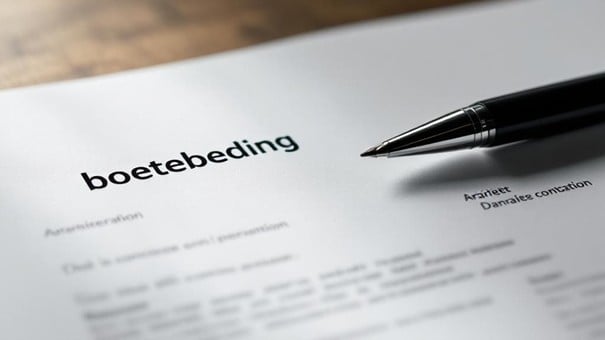Our Blog
Law and More – Articles and News

Travel Ban and Declaration of Undesirability in the Netherlands
Travel bans and declarations of undesirability in the Netherlands are more than just inconvenient—they can reshape your entire life. A single conviction for an offence punishable by three or more years in prison can trigger a sweeping ban that blocks access to not only the Netherlands but the whole Schengen Area. But here’s the twist.

Dismissal in probationary period
Dismissal in the probationary period means that both employer and employee can pull the plug on the partnership immediately. This can be done without notice and without a complicated procedure at the UWV or the subdistrict court. So it is a quick way out if, in practice, the match turns out not to be as

Understanding the Difference Murder and Manslaughter
Most people know that murder and manslaughter are both serious crimes in the Netherlands. Yet murder can lead to life imprisonment or thirty years, while manslaughter has a maximum of just fifteen years. Here is the twist. The difference between them often rests on a single question about intent and timing that can completely change

Terminating an agreement: this is how to do it right
Terminating an agreement correctly. It may sound like a formality, but in practice, it is much more than just sending a note. It’s about knowing your rights and the terms within which you are acting. Proper termination can save you a lot of hassle, unexpected costs, and legal headaches. The basis for a successful notice

How to Get Dutch Citizenship in 2025: A Complete Guide for Individuals and Businesses
Thinking about Dutch citizenship in 2025 might feel daunting, especially with so many rules to consider. Here is something that catches most people off guard. To even apply, you have to prove five years of continuous legal residence and pass a challenging integration exam that covers both language and culture. Yet, what truly surprises new

Guide to reorganisation redundancies
The announcement of a redundancy during reorganisation often hits like a bomb. It immediately evokes a sense of uncertainty, because what exactly does this mean for your job? At its core, your employer is adjusting the company structure, and this can unfortunately lead to dismissal on business grounds. This kind of intervention rarely comes out

Computer Crime and Cyber Crime in the Netherlands
Computer crime and cyber crime are often mistaken for the same thing in the Netherlands, yet the difference is more than just a technicality. Cyber crime in the Netherlands saw a sharp 127 percent increase in reported incidents last year. Most people cringe at headlines about data leaks or ransomware, expecting high-tech hackers as the

Alcohol and Driving: Consequences for Your Driver’s Licence in the Netherlands
Alcohol and driving in the Netherlands carry consequences that reach much further than most realise. Every year, authorities issue over 4000 immediate licence suspensions for alcohol violations across the country. That sounds strict but here is the twist. Even a single standard drink can push novice and professional drivers over their legal alcohol limit, instantly

Legal Options If Your Neighbours Build Without a Permit
Neighbours sneaking up new sheds or extensions without any approval might seem like a harmless shortcut, yet the reality in the Netherlands is much less forgiving. Fines for unpermitted construction can soar into the tens of thousands of euros and could even force your neighbour to tear the whole thing down. That is not the

NIS2 in the Netherlands: Legal Advice and Business Steps for 2025
NIS2 will shake up how Dutch companies handle cybersecurity, reaching far beyond IT departments and checklists. Penalties for non-compliance can hit €500,000 or 4 percent of global turnover, which is enough to make any boardroom sit up. You might think this is just another regulatory headache for businesses. Yet these tough new rules are pushing

Employee sickness rights: what you need to know
Reporting sick and now what? Your first steps When you call in sick, as an employee you immediately have a number of important rights. The most fundamental are the right to continued payment of your wages and the protection of your privacy about exactly what ails you. These rights are the foundation of your security

False Accusation or False Report: What Are Your Rights?
Facing a false accusation can turn a life upside down in the blink of an eye. While many assume the Dutch legal system is quick to judge, the opposite is true. The Netherlands offers some of the most comprehensive protections in Europe, including the right to silence and the ability to seek compensation for both

Employer’s rights and obligations
Your first steps as an employer: navigating Dutch employment law Taking the step from entrepreneur to employer is an important milestone. Your business is growing and you are ready to hire your first employee. This opens up a new world full of rules, documents and responsibilities. It may seem a bit much at first, but

Dutch Residency Permits
Dutch residency permits are changing the game for both individuals and businesses in 2025. Think securing a visa is just paperwork and a waiting period? That is only scratching the surface. With application fees now ranging from €170 to €350 and a maze of different permit types, knowing the clever details can make or break

Rights on dismissal: everything you need to know
Why knowing your termination rights is crucial to your career Picture this: Monday morning, coffee in hand, and your boss calls you in. Moments later, you are outside again, with a message that hits like a bomb: you have been fired. This is a spectre for many, but for tens of thousands of Dutch workers

Business Dispute Resolution in the Netherlands
Business disputes can derail even the most successful companies in the Netherlands. Surprising as it is, shareholder conflicts make up a significant portion of all corporate legal fights in the country, not just contractual rows or intellectual property stand-offs. Yet the real shock is how the method you choose to settle a dispute can change

Drug possession in the Netherlands: the surprising reality behind the tolerant image
The Netherlands has a global reputation for being tolerant when it comes to drugs, with the coffeeshops in Amsterdam being the best-known symbol. This image gives many, both in the Netherlands and abroad, the impression that drug possession has few legal consequences here. However, that assumption is an oversimplification of a much more complex reality.

How to Handle Intellectual Property Disputes
Intellectual property disputes in the Netherlands catch out more businesses than you might think. Nearly half of Dutch companies have faced some kind of intellectual property conflict in the past five years. Most people assume that courts and legal red tape are the biggest hurdles. That is not the full story. The real challenge is

Child Custody in the Netherlands
Dutch child custody laws have changed rapidly, creating a real impact on families and workplaces alike. Since January 2023, both parents automatically have equal legal rights and obligations when a child is born in the Netherlands. That sounds straightforward, right? Not quite. The real surprise is how much these new rules ripple beyond the family

The Criminal Procedure: From Investigation to Verdict
Dutch criminal courts hand out over 43,000 verdicts every year, shaping the fates of people from every walk of life. Most expect dramatic courtroom scenes or endless cross-examinations. The real surprise is that in the Netherlands, judges take the lead and fine-based sentences are far more common than jail time. This flips the script on

Criminal Liability for Statements Made on Social Media
Social media posts in the Netherlands are more than just fleeting digital thoughts. They can carry very real legal consequences. Every year, dozens of Dutch users are prosecuted for online statements that cross the line into hate speech or defamation. It may sound surprising, but just a single reckless comment can land someone in serious

Arrest and Police Custody: What Are Your Rights?
Getting arrested in the Netherlands is more common than you might think. Every year, over 100,000 people experience arrest or police custody in the Netherlands, ranging from minor infractions to serious allegations. It sounds intimidating. But here is the surprising part. Many do not realise that you have the right to remain silent and to

Go to Trial: What is the Smart Choice for Legal Cases in the Netherlands
Deciding whether to go to trial can change everything in a Dutch legal dispute. Many assume that courtroom battles are inevitable when things get tough. Here is the surprise: almost 70 percent of legal cases in the Netherlands are settled before ever reaching trial. Choosing the right moment to proceed, or not, could save you

What to Do if You Are Suspected of a Criminal Offense? Guidance for Companies & Expats in the Netherlands
Being suspected of a criminal offence in the Netherlands sends a ripple of worry through both companies and expats. Oddly enough, most people panic at the thought of questioning when they should be focusing on their rights. Here is a startling fact to keep in mind: as soon as authorities have a reasonable indication, you

Penalty clause in employment contract
Why a penalty clause can be the salvation for your business Suppose your key sales manager leaves for the competition and takes your entire customer base with him. A nightmare scenario. What can you do? A penalty clause in the employment contract can help. Think of the penalty clause as a kind of safety net,

Non-compete Temporary Contract: What You Need to Know
Why competition clauses in temporary contracts are so different Suppose you have a six-month temporary contract. You’re excited to get started. Then suddenly you see a non-compete clause. You are not allowed to work for a competitor for another year after those six months. That feels like you are being punished for finding a new

How to Claim Damages in the Netherlands
Many expats and businesses worry about claiming damages in the Netherlands, especially when the legal system can appear overwhelming and technical. Here is the surprise. Missing the strict Dutch limitation periods can mean losing your right to compensation completely. Yet most claimants never realise that success relies just as much on strategic documentation as it

Child Custody Laws in the Netherlands, A Guide for International Families
Child custody laws in the Netherlands are more intricate than many expect. Most parents assume getting joint parental authority is straightforward, but here is a surprise. Over 80 percent of Dutch custody cases now encourage mediation over going to court. This shift is actually reshaping family life for expats and international families. The real question

How to Terminate Employment in the Netherlands
Sorting out employment contracts in the Netherlands is never simple. With Dutch law only allowing dismissal for specific statutory reasons and requiring employers to follow detailed procedures like obtaining UWV approval for economic cases, most companies expect paperwork to be the main headache. Yet, the real surprise comes later. Even with all your forms in

Child Adoption Laws Netherlands
Child adoption in the Netherlands has never been more challenging or closely regulated. In 2025, the government has put in place a complete ban on new international adoptions, reshaping the process for expats and companies alike. Surprised? You might expect strict laws, but what’s really jaw-dropping is just how tough the new screening and documentation